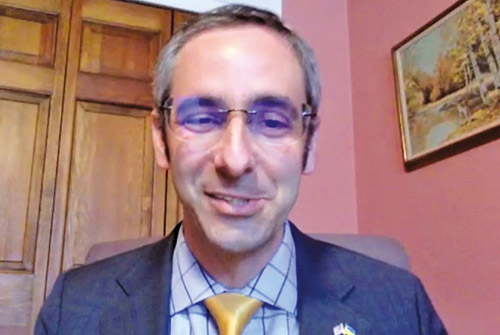



On March 22, UJA-New York hosted a virtual briefing with the rabbis who just traveled to Poland to meet refugees fleeing Ukraine. Speakers shared their reflections of the work on the ground assisting hundreds of thousands of refugees and those still in Ukraine. UJA provides local initiatives with organizational, logistical and financial support.
Eighteen local rabbis of all denominations were on the mission. Amy Bressman, president of UJA-Federation stated: “I feel so lucky, I get to be part of an organization that makes the world a better place. This past week, I was able to see how we make a difference in the lives of those far from home. We visited Warsaw, Lublin and the Ukrainian border. Four weeks in, the EU estimates 5 million refugees and displaced Ukrainians remaining over 10 million,
the largest refugee crisis in Europe since World War II.
“Thanks to you, UJA approved another round of emergency grants, bringing our total Ukrainian relief funding over $8 million,” Bressman said. “We are providing food, bedding, transportation and medical supplies. We’ve helped hundreds make aliyah.”
Rabbi Steven Exler of the Hebrew Institute of Riverdale reflected on this trip: “Sunday night, 40 minutes outside Warsaw, we got off the bus in Srodborow, at what looked like a little kibbutz, a grassy patch and stucco structure that reminded me of a cheder ochel. We were greeted by someone who spoke Hebrew, who took our humanitarian-aid supplies collected from our communities.” Rabbi Exler described a peaceful, beautiful scene where families were finishing dinner, and colleagues distributed Purim candy bags. In a back room, they added toiletries, oatmeal packets, baby supplies and wipes. “These are things people who left their homes no longer need for survival but can bring with them for the next stage of their journey that they may not even know what it’s going to be. We’re agents of our own congregations and New York’s Jewish community.”
Rabbi Exler then described meeting Warsaw’s Jewish Community President Lesław Piszewski, dressed in work clothes and a sweatshirt, working to leverage all the community’s resources for Jewish and non-Jewish refugees alike. Piszewski said they were trying to sell a community campsite, used for Jewish cultural experiences even during communist rule, but recently pulled it off the market and hundreds have already passed through. “That’s the immediate pivoting these Polish Jewish community institutions have done,” Rabbi Exler said.
“The challenge is, not just weeks and months but years, of potential invisibility of the refugee crisis. You could drive by refugee centers and not know it, with millions of refugees without homes to return to. Communities around the world will need to remember,” he said.
Hindy Poupko, UJA-Federation deputy chief planning officer, in response to colleagues asking, “Why bring rabbis?,” said, “Our rabbis serve as our educators and leaders. They don’t tell us what we want to hear but often what we need to hear and pay attention to. These particular rabbis are well-known for leadership, courage and now, because of what they witnessed, able to advocate for refugee relief.”
Lincoln Square Synagogue’s Rabbi Shaul Robinson, said: “It’s almost a full week since we landed back in New York. I know that none of us have stopped thinking about this incredible trip, both the tragedy and the uplift of what we saw. Tragedy for people who, just a few weeks ago, life was completely normal, stable and prosperous. Suddenly, women and children needed to leave everything behind, run for their lives and not know when they’ll see their families again.”
Robinson continued: “Unlike 70 years ago, refugees cross Europe’s borders with people waiting with hand warmers, SIM cards, bandages and coffee and tea, by the work of the Jewish community.” Millions of individuals need help. It’s a population shift, a relocation, for better or for worse—thousands of Jews leaving their homes in Ukraine. One can speculate about what’s going to come after the war, in the rest of Eastern Europe. What we’re seeing is a catastrophe of worldwide proportions.”
Rabbi Chaim Steinmetz of Kehilath Jeshurun described a silver lining: “Looking back, what’s happening now is remarkable; 80 years ago, the Jewish world was very different. Now you have a State of Israel; the Prime Minister mediating between the two sides. In Poland, we saw the dramatic change with our own eyes. The first flag that refugees crossing the Medyka border see is Israel’s. One group got on a bus in transit to Israel—how things have changed in 80 years. It challenges us to recognize what we have accomplished in the past 80 years and there’s so much more we can accomplish.” Rabbi Steinmetz quoted Poland’s Chief Rabbi Schudrich: “In Poland, we’re used to being refugees, not taking in refugees.”
To learn more how you can help with UJA’s efforts, visit https://www.ujafedny.org/.










